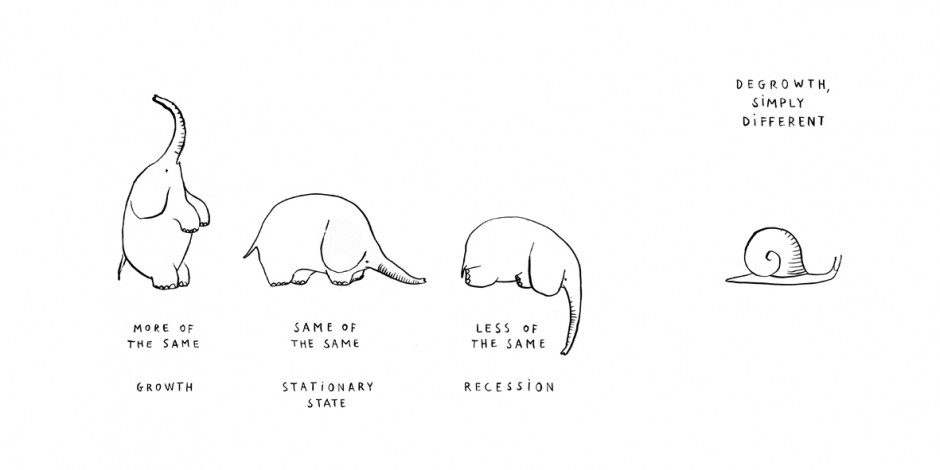On our mailing list, Giorgos Kallis shared the following call for papers:
CFP: Geographies of DegrowthAmerican Association of Geographers meetingApril 5-9 2017, Boston, MAOrganizers: Giorgos Kallis (Autonomous University of Barcelona), Karen Bakker (University of British Columbia), Federico Demaria (Autonomous University of Barcelona)A movement of activists and intellectuals in France, southern Europe, and beyond has given the name “décroissance” (degrowth) to its vision for an alternative to capitalist socioecological relations. Degrowth signifies a ruthless critique of the ideology of economic growth and of its material effects, as well as a search for alternatives beyond a ‘one-way future consisting only of growth’ (Le Guin, 1982). Degrowth draws from the postdevelopment and antiutilitarianism literatures, Georgescu-Roegen’s understanding of the economy as an entropic process, and post-Marxist intersections of socialism, anarchism and ecology.The intellectual genealogy of degrowth includes the likes of Andre Gorz, Ivan Illich, Cornelius Castoriadis and Hannah Arendt, while there are many parallels with Murray Bookchin’s libertarian municipalism. The contemporary theory of degrowth articulates a new analytical vocabulary around concepts such as ‘autonomy’, ‘conviviality’, ‘care’ and ‘dépense’ (unproductive expenditure) (D’Alisa, Demaria, and Kallis 2014). Degrowth is invoked by prominent scientists (Anderson and Bows-Larkin 2013) and radical intellectuals (Klein 2013) in the context of climate change given the incompatibility between continued economic growth and staying within the 2 oC temperature change. Degrowth inspires and is inspired by grassroots practices, movements, and green-red politics (Baykan 2007, Demaria et al, 2013); and its theory speaks to pertinent debates in political ecology and critical geography, such as scarcity and limits, or the politics and scales of a postcapitalist transition (Kallis and March, 2015). As some advanced economies face a period of prolonged economic stagnation and the hegemony of the imaginary of growth is unsettled, degrowth poses the question of whether, or rather how, conditions of crisis may be turned into an opportunity for a radical, egalitarian socio-environmental transformation.Geographers have traced the embodiment of the imaginary of degrowth in fiction and grassroots initiatives (Kallis and March, 2015), have deconstructed the depoliticizing effects of the growth discourse (Swyngedouw, 2015), and have investigated how cities and their politics adapt to the prolonged and foreseeable absence of growth (Schindler, 2016). Nonetheless, there is scope for more geographical research on the processes and theory of degrowth, and cross-fertilization between degrowth and studies of diverse economies, decolonization, discard and waste, urban (regional) shrinkage, or economic and environmental geography.We are particularly interested in papers that address one or more of the following topics (this is only an indicative list):
- historical analyses of the genesis and expansion of the growth paradigm (e.g. Dale, 2012); how the hegemony of growth was created and how it is reproduced in public, political and institutional discourses and practices (e.g. Schmelzer, 2016).
- capital accumulation and the growth imperative, the limits to degrowth within capitalist systems (e.g. Foster, 2011), (de)growth and socialism.
- cities, regions or countries that manage without growth (e.g. Schindler, 2016).
- degrowth-related ideas in contemporary social movements, grassroots initiatives or other ‘nowtopias’ (e.g. Kallis and March, 2015, Carlsson and Manning, 2010, Demaria et al, 2013, Asara, 2016).
- changes in the forms and distribution of care-work in stagnant economies; studies of the ways that grassroots degrowth or other nowtopias reproduce or challenge patriarchal structures and redistribute (or not) carework (e.g. D’Alisa and Cattaneo, 2013).
- theoretical engagements with the classical thinkers that inform the degrowth literature (eg Gorz, Illich, Castoriadis, Bookchin, Arendt). Links with other thinkers that may not have been mobilized yet in degrowth debates.
- applications and developments of core concepts of the degrowth vocabulary (autonomy, conviviality, care, dépense, etc) in concrete geographical or ethnographic contexts.
We invite interested participants to send their title, 250-word abstract, and affiliation to Giorgos Kallis (giorgoskallis@gmail.com), Karen Bakker (karen.bakker@ubc.ca) and Federico Demaria (federicodemaria@hotmail.com) by October 15, 2016. We will notify accepted participants by October 22.


